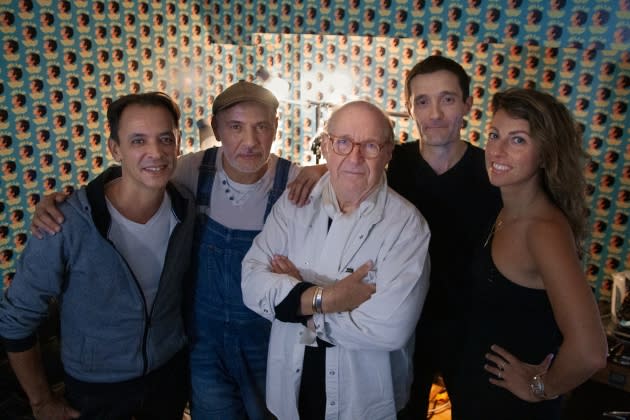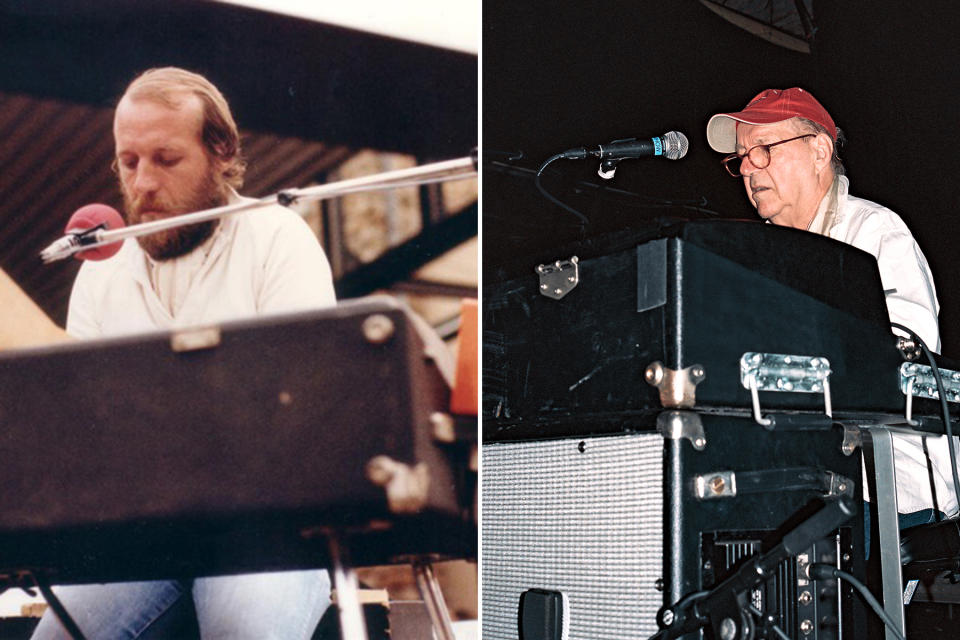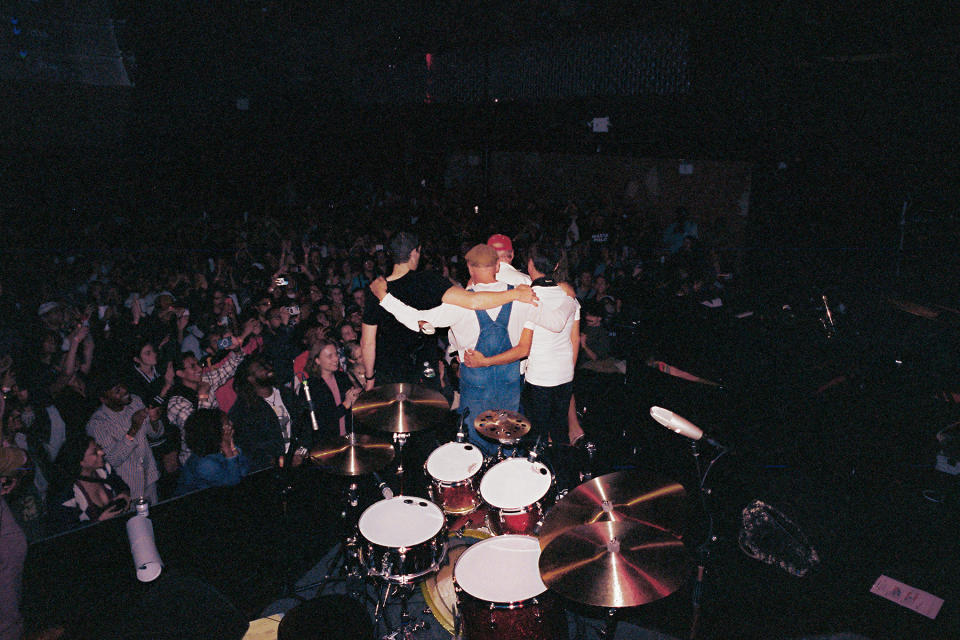How Cortex’s Troupeau Bleu Became Hip-Hop’s Favorite French Jazz Album
- Oops!Something went wrong.Please try again later.
- Oops!Something went wrong.Please try again later.
- Oops!Something went wrong.Please try again later.

As the doors of Music Hall of Williamsburg opened on Sept. 28, concert-goers of all ages wearing MF DOOM memorabilia quickly filled the Brooklyn venue — only to eagerly change their outfits for merch with the name of a French jazz album from the Seventies. Within 10 minutes, Cortex’s Troupeau Bleu tees had run out.
“R.I.P. MF DOOM!” one fan screamed as the band hit its stride onstage at its first-ever U.S. show.
More from Rolling Stone
Rick Ross Dons Balmain While Taking 'Accountability' for Labor Law Violations at Wingstop Locations
Black Thought and Danger Mouse's 'Cheat Codes' Will Make Old-School Heads Feel Seen
Nabil Ayers Looks Back on His First Sit-Down With His Jazz-Legend Father
“Ah, yes,” Alain Mion, Cortex’s 75-year-old frontman and pianist, responded, before lightheartedly adding, “But me — not yet.”
The thirst for anything related to Troupeau Bleu wasn’t surprising, seeing as the 1975 album’s first vinyl pressing has been sold for almost $1,000 on Discogs. It’s a familiar name if you’ve spent long enough digging for the samples of your favorite rap tracks: Troupeau Bleu has been sampled at least 142 times to date, with its blend of psychedelic jazz, soul, and funk finding its way into songs by underground legends like DOOM and J Dilla, along with rap royalty including Lupe Fiasco on “Mural” and Rick Ross on “Amsterdam,” “Oyster Perpetual,” “Everything a Dope Boy Ever Wanted,” and Jeezy’s “Beautiful.”
The most recognizable selections come from “Huit Octobre 1971,” a song named after Mion’s wedding anniversary with his late wife. Vocalist Mirelle Dalbray’s angelic high-pitched scatting and Alain Gandolfi’s frenzied drum breaks have been also used in DOOM’s Madlib-produced “One Beer,” Tyler, the Creator’s “Odd Toddlers,” Wiz Khalifa’s “Visions,” and Lil Yachty’s aptly-named “Cortex,” among dozens of other songs.
With the prolific use of Troupeau Bleu in hip-hop for over two decades, would it be fair to anoint the record as hip-hop’s favorite jazz album? “It’s not an overstatement,” says New York drill wunderkind Cash Cobain. “It’s a fact.” Cash Cobain discovered Cortex when he heard Tyler’s “Odd Toddlers” in 2009 and has been a fan of the jazz band since then, going on to produce Yachty’s “Cortex” 12 years later.
Industry giants like Madlib and Rick Ross have a substantial archive of Cortex-injected tracks, but Tyler may be Cortex’s most prominent fan today. While he declined to respond to Rolling Stone’s request for comment for this story, he was there at Music Hall of Williamsburg, dancing through the night in a closed-off section of the club; Tyler even posted about his love for Troupeau Bleu during the concert in a since-vanished Instagram story.
Speaking in the green room before the show, which kicked off a tour that also included dates in Los Angeles and at the Desert Daze festival, Mion has his own theories about why his music has resonated with a younger generation of rap musicians. “People in hip-hop use a lot of soul music,” he says. “[Troupeau Bleu] has soul, it’s particular, it’s original, and it’s French.” He quips: “It could also be because we’re geniuses.”
Gino Sorcinelli, creator of Micro-Chop, a popular Twitter account and newsletter dedicated to dissecting sampling and music production, says it’s all about Troupeau Bleu’s distinctive sound. “All the drum hits are crisp as fuck, every piano and organ sequence is impeccable, the basslines sit perfectly in the pocket and complement each composition, and Mireille Dalbray’s vocals are unbelievable,” he says. “They sound like they’re floating on top of each track.”
Jazz and hip-hop have a long, intertwined history together. Both forms originated in the United States, and their genealogies are rooted in the Black American experience. The symbiotic relationship is ancestral, dating back to the 1920s Harlem Renaissance, when Langston Hughes innovated reciting poetry over jazz rhythms, inadvertently creating the literary art form of jazz poetry. The connection between the two improvisation-based genres evolved with hip-hop producers’ adoption of breakbeats, syncopation, and sampling; by the 1990s, acts like A Tribe Called Quest, Gang Starr, and Digable Planets could build a substantial part of their musical identity around their appreciation for jazz.

Cortex’s history with sampling is a bit more complicated, which could be one reason the band has flown under the radar for so long, despite its appeal to sample-flippers. The first documentation of Troupeau Bleu being used in a hip-hop track is in DJ Cam’s 1997 experimental hip-hop instrumental “Bronx Theme,” where he sampled the record’s title track. Madlib then sampled “Huit Octobre 1971” in his 2003 track “No Games” with J Dilla, for their collaborative project Jaylib, before sampling the same song in DOOM’s “One Beer” and his own “Mind Fusions (Intro).”
In the ‘90s and early 2000s, sample-snitching was against the rules of hip-hop, with discussing the sources of a rare loop strongly discouraged. “That rule robbed us in the beginning,” Mion says. “It’s no more like that, because every label doesn’t want to go to court. They say, ‘Mr. Mion, please accept this contract with us.’ And every time I say yes.”
Mion recognizes that hip-hop’s love for the album has only prolonged its shelf life, and acknowledges how all of the sampling was ultimately a good thing. While rap is still not necessarily his taste, he mentions: “There is one rapper I really like. Lupe Fiasco. I just love his energy. If he was a businessman, he could sell me anything!”
Mion is currently the sole remaining founding member of Cortex; the current touring group is comprised of vocalist Maeva Borzakian, drummer Cedric Affre, bassist Mohamed Ouraz, and saxophonist Loic Soulat, each with their own heartwarming relationship to Mion. Borzakian called Mion, hoping it wasn’t too late to audition. They then spent two hours on the phone talking about music, learning how much their tastes align. Ouraz bought the house directly across from Mion in the Paris suburb of Bourg-la-Reine and the two bonded over their love of jazz. Soulat, meanwhile has known Mion since he was nine years old — the Cortex leader was his childhood piano teacher. “But he wasn’t as good as me,” Mion jokes. “That’s why he plays the saxophone.”
The original band’s founding was equally serendipitous. “I met two young American musicians in Paris,” Mion says. “They made an announcement in the American Center in Paris and said that they wanted to play music with Frenchmen, so I called them. And that was the beginning of a beautiful story,” he recalls fondly.
One of those musicians was the now-deceased Jeff Huttner, who’s recognized as one of the three founders of Cortex. Although Huttner was replaced by Jean Grevet on Troupeau Bleu’s recording due to prior obligations in the United States, he remains rooted in the band’s story through “Mary et Jeff,” a romantic highlight of the 1975 record.
The rest of the recording band has also since passed away or moved on from jazz music. Saxophonist Alain Labib is now a professor who studies cancer. Cortex co-founder and drummer Gandolfi is a talented classical music sound engineer. “[Gandolfi] said that he thought — completely stupidly — that he was not a good drummer,” remarks Mion, sweetly laughing. “I think that he is très bien.”

Today, Cortex can take their rightful place as a key influence on generations of rap acts. “It took hip-hop to provide the vantage point for the world [for jazz] — to tell people why our shit is dope,” Adrian Younge said as he introduced Cortex’s show in Williamsburg. The host, DJ, and curator of Jazz Is Dead, an event company and record label pushing the modern-day jazz movement, continued: “They don’t realize all the ill cats that’s still alive and around, but leave it up to us cool kids to come out in droves and support. What we’re doing tonight, we are going to let them know how much we appreciate them while they’re here today. Because we give flowers, not after the fact.”
The interview with Cortex was conducted largely in French. We have attempted to provide as accurate a translation as possible.
Best of Rolling Stone

